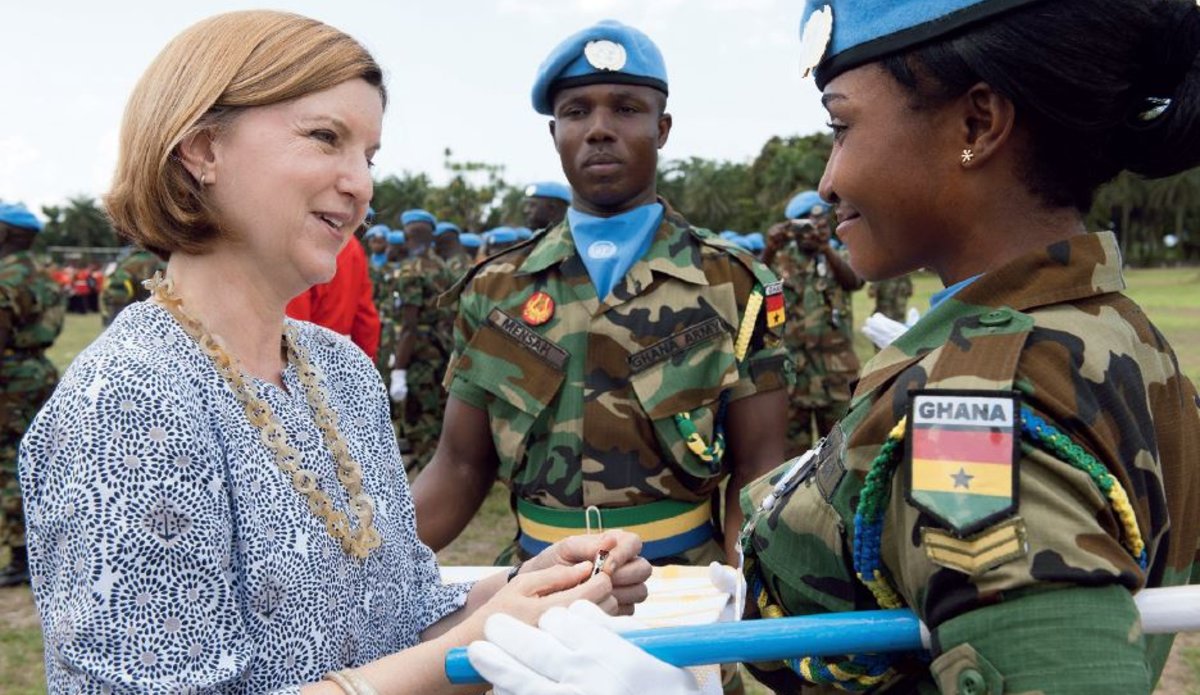Staying strong during Ebola | Karin Landgren, Under-Secretary-General, Special Representative of the Secretary-General (2012-2015)
 In 2012, Karin Landren of Sweden became UNMIL’s fourth SRSG, having already led missions in Burundi and Nepal. Less than two years into her job, Ebola arrived to decimate Liberia, and SRSG Landgren was tasked with leading UNMIL’s support to the response to the crisis which she called “14 months of a national nightmare.” More than 3,000 Liberians died, and the Security Council recognized the extent of the outbreak in Africa as a threat to international peace and security.
In 2012, Karin Landren of Sweden became UNMIL’s fourth SRSG, having already led missions in Burundi and Nepal. Less than two years into her job, Ebola arrived to decimate Liberia, and SRSG Landgren was tasked with leading UNMIL’s support to the response to the crisis which she called “14 months of a national nightmare.” More than 3,000 Liberians died, and the Security Council recognized the extent of the outbreak in Africa as a threat to international peace and security.
Before Ebola struck, the Mission had been concentrating on supporting national institutions, strengthening the rule of law, supporting national reconciliation and building up the country’s security sector. The crisis threatened to undo much of the work done by the UN and Liberians since the end of the civil war and exposed the lack of Government authority.
“The UN and other partners recognized quite early on that this was more than a public health crisis,” Ms. Landgren said in 2015 as the disease was brought under control. “Certainly, health services collapsed almost immediately. But there were immediate risks to public security. Commodity prices grew and people became restive about that. There was a state of emergency and the army was called out.”
There was talk of a coup, she recalled, and the Mission leadership met to plan for the possibility of “catastrophic state collapse.”
As the Government had no credibility or presence, communities took the initiative to organize among themselves. UNMIL Radio broadcast lifesaving messages across the country. Still, Ms. Landgren said, many Liberians thought Ebola was either a myth or a curse. She ordered the Mission to stay and keep operating.
“I’m convinced that the continued presence of UNMIL was reassuring to the population, and the fact that we had offices all over the country actually contributed to convening the actors who needed to come together,” she said. Ms. Landgren says that Ebola was turned around by three factors: advocacy, removal of suspected cases and robust contact tracing. She credited unsung heroes such as the local grave diggers, Médecins Sans Frontières but also people like Dr. Peter Clement Lugala of Uganda who went to the Ebola epicenter in Lofa county, bought plastic sheeting in the market, and had it sewn into body bags.
Liberia, she noted, had the lowest concentration of doctors in the world, i.e. 1.4 doctors per 100,000 people, or about 50 in total. Widespread poverty, but also corruption was a factor in Ebola as funds destined for public health had been diverted. Liberia’s “debilitating patronage network” contributed to the country’s inability to confront the disease, as was the concentration of political administration in Monrovia.
Landgren had long stressed the need for Liberia to decentralize government services. “This is a national challenge which will be longer in duration than the life of the peacekeeping mission,” she said.
During her tenure, UNMIL continued its drawdown of troops. Among her concerns was helping the Government to strengthen its own security sector, as UNMIL was due to handover responsibility for security in 2016.
 UN
UN United Nations Peacekeeping
United Nations Peacekeeping





